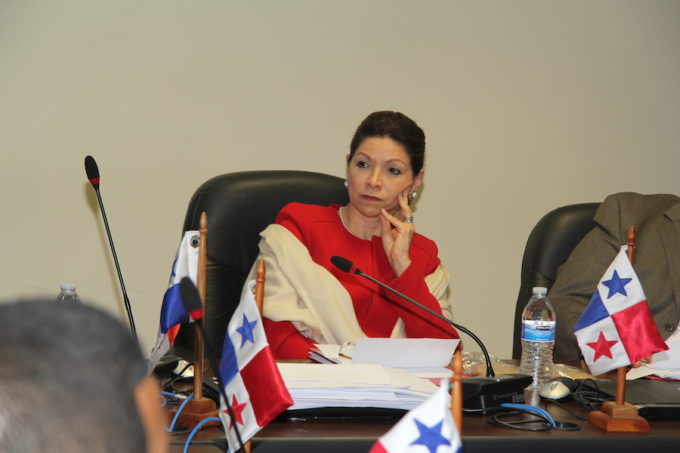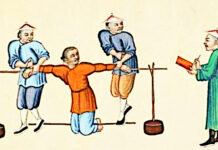
What did the deputies do in their end-of session rush?
by Eric Jackson
WHAT? You actually TRUST the legislature to do the right thing? Isn’t that the very definition of the word “pendejo” in one of its Panamanian Spanish senses?
You may, however, be one of these people without functional instincts about trust, and who instead of just across-the-board disbelief, looks at the structures of things. If you look at the structure how the sessions of the Panamanian National Assembly work, however, you will probably still be inspired to something less than full confidence.
What happens is that over the course of a session some things, generally things sent by the president’s Cabinet Council, get debated in committees, are the subjects of public hearings, maybe undergo a change or two in the process but are approved by the committee on first reading, then sent on and approved on second and third reading and sent back to the president for signature or veto. As the president has the power of a partial veto, certain sections might get excised that way — it does limit the games that get played with amendments, except that a veto can be overridden by the legislators.
Other things just get blocked. Most controversial proposals made by legislators suffer this fate. Sometimes things sent by other institutions — the Panama Canal Authority, the Electoral Tribunal, perhaps the Presidencia — go down in a wave of public protests or amid the ripples of quiet comments by powerful interests.
Meaningless tweaks in governement structures, the naming of things, the declarations of special days or weeks or months to honor this or that group — those are the usually easy things that condescending deputies can show off to their constituents to prove that they have accomplished things. (But was it a snide Maoist plot against many of the coolest of editorial commentators on the politicians’ labor when the National Assembly declared May 7 to be that special day to honor cartoonists?)
In all, the deputies passed 14 things on the last day of the legislative session, with horse trading and amendments that did not make it to the National Assembly’s website where people can usually go to see the texts of laws to be considered, both the proyectos that generally come from other branches of government and the anteproyectos usually proposed by deputies. Four more laws that had been partially vetoed by President Varela ere reconsidered, with some of the vetoes overridden. This, at the end of a short week in which 30 proposals of law went to the full legislature for votes on third and final reading.
To put it in perspective, in the legislative session from January 2 to April 28 the National Assembly considered 148 matters and passed 80 proposals.
The structure of such jam-ups at the end of the legislature’s regular sessions mean amendments snuck in while hardly anybody was paying attention, laws with lengthy annexes that few read or with maps that go uninspected, fatigue among those deputies who try to actually do the work and a lot of votes on things unread by their lazier colleagues. Set aside whether or not you can trust the smiling politicians who want your vote — the structure of the way their job is done ought to sap your confidence.
Several of these bits of legislation were not spur-of-the-moment, however. They were controversial “leftovers” from previous sessions, perhaps with some last-minute amendments that we will only know when the president has signed them, they are published in the Gaceta Oficial in their final form and we are shocked to learn about the details.
Some of the major things that the deputies did at the end of their session:
The rights of women and families
A sexual harassment law, proposed by independent deputy Ana Matilde Gómez, which attracted most attention for a fine-enforced ban on catcalls on the streets, was approved. She had been working on this since 2015. Get into the text of the law and it calls for studies and action plans that with any decency and awareness shown in the presidential palace will end up with implementing regulations about hostile work environments and many other instances of discrimination in society, not just against women.
There was a partial decriminalization under certain circumstances of child abandonment by mothers in distress. Infanticide and the abandonment of newborns are subjects broached in some of the most ancient legends and literature of Western civilization that have come down to us. In England, their Common Law has developed a presumption of postpartum psychosis that generally makes incidents in which a mother kills or abandons a newborn a mental health issue rather than a criminal case. In the United States, particularly in the bastions of the religious right, a mother who kills her newborn may well face the death penalty and those who abandon their newborns generally face years in prison. It’s not particularly a cultural issue, but rather a matter of how postpartum mental symptoms are actually common, a problem compounded by the breakups of extended families as the result of urbanization, of men who abandon their children and the women they impregnate and of the economic pressures that a single woman may face. So Anteproyecto 1, the first law proposed in the just-ended legislative year — again, by Ana Matilde Gómez — passed on the last day of the year’s second session. The new law creates a Protection System for Abandoned Newborns (SISPRENVA, by its Spanish initials), which among other things excludes criminal prosecutions for mothers who abandon their newborns to health care facilities designated for that purpose.
So do men have family responsibilities, other than to pay child support? The legislature passed a proposal that came its way via Minister of Labor Development Luis Ernesto Carles, which implicitly — and, critics say, timidly — recognizes something of the sort. Employers will have to give three days of paternity leave to public or private sector workers on the occasion of their sons’ or daughters’ birth. Business and labor leaders who spoke at the hearings on this legislation agreed on the principle of paternity leave, which is in line with the laws in most other countries.
Taxation
Can we put a starting point on it and blame some particular president? The nation’s public debt has ballooned in the past decade, and there have been all sorts of proposals to raise taxes or fees. These are, of course, unpopular. Whenever word gets out about such a thing, the National Assembly’s deputies tend to get pestered by angry or alarmed constituents. In the Martinelli years there was a proposal to reassess the country’s real estate values for tax purposes. The proffered reason was to revalue the places which, due to the political pressures brought to bear by the rich, were most egregiously undervalued. Gerardo Solís may have had his property unlawfully searched by a government-rented helicopter, but the photos plus the registered tax value of his beachfront property made news that destroyed his 2014 presidential campaign and will probably come back to frustrate his 2019 candidacy. It might have been quite the fairness issue to elect Martinelli’s proxy candidate, except that it soon developed that the plan was not entirely as projected. Sure, some historically undervalued places were getting reassessed. But so were some places that were nothing of the sort There middle class neighborhoods in Panama City which Martinelli’s developer friends wanted to acquire and a steep increase in taxes would force the homeowners to sell to them. Some beach communities — the Eisenmann family’s original Coronado development, for example — would be hard hit, which other beach developments in which the Martinellis reputedly held stakes would be exempt. Did the likes of former Chame – San Carlos Martinelista deputy Junior Herrera pass it off as just a hit on the rich foreigners? Even to the extent that it was, many voting Panamanians do a lot of business with those foreign residents and they were not amused. The reassessments were underway when a public outcry stopped the program in its tracks. There had already been reassessments of many properties in or along Punta Paitilla, Punta Pacífica, Costa del Este, Obarrio, Marbella, Vía España, El Carmen, Coco del Mar, Altos del Golf and the Chame and San Carlos beach areas. Those new numbers were on the books, even though the tax bills had not changed. But the legislature passed a to retroactively call those Martinelli-eras assessments null and void.
Corporate welfare
The Panama Canal Authority never got legislative support for its Corozal and Diablo seaport project. It is said by the canal administrator that this was due to the opposition of the existing port operators — who indeed opposed it, along with local residents, PanCanal pilots and others — but in the final instance nobody wanted to bid on the project. But if the prospects of the container shipping business are so dicey as to prompt trepidation about new investments, the older ports aren’t bailing out. Colon Container Terminal, a division of the Taiwan-based Evergreen, was given a 20-year extension on its concession in Coco Solo Norte for the Colon Container Terminal.
Is the banana industry coming back to Puerto Armuelles? Most probably, and it’s a good bet that the now blight-prone Cavendish banana won’t be what they are growing. With very little debate the legislator approved a contract that essentially gives away the old Chiquita plantations in the area to a Del Monte subsidiary in exchange for a promise to get banana production going again. The hope is that the economically devastated area will get the several thousand jobs that used to exist back. But meanwhile the old plantations were devolved into a cooperative, which more or less went belly-up, and which in turn were divided up into one-hectare farms among that co-op’s members. The contract purports to sell these farms to Del Monte for $7,500 apiece. This will seem like a good deal to many people who expect to get jobs as part of the bargain. But not all of the property owners stand to get jobs, and not all of them think that the price offered is in any way reasonable. Look for court battles over eminent domain to follow, with a just-approved contract by which the Panamanian government holds Del Monte harmless if it is decided that homeowners who object are owed more than is stipulated in a contract to which they are not parties.
Some new political divisions
On Panama City’s northwest side, the corregimientos of Alcalde Diaz, Chilibre, Las Cumbres, Caimitillo and Ernesto Cordoba Campos seceded to form the new municipality of Norte. It was one of those velvet divorces, with Panama City Mayor Blandón’s blessing and in the works since 2015. The copper mine also got its own city, by way of the hiving off of a new municipality of Omar Torrijos Herrera from that part of Colon province’s Donoso district west of the Miguel De La Borda River. Darien’s Chepigana district was also divided, to create the new municipality of Santa Fe. A slew of new corregimientos were created around the country. In Panama City these included Don Bosco, which will be taken out of Juan Diaz, and Las Garzas, which is to be separated from Pacora.
Culture
So many of the special days, changes in the names of things and so on are at their bottom celebrations or promotions of parts of Panama’s cultural legacy. Most of this legislation isn’t particularly worth mentioning. There were a couple of exceptions to this in the late legislative session’s final days. One sets up a foundation (“patronato”) to preserve and restore the architecture and murals of the Juan Demostenes Arosemena Normal School in Santiago, which are internationally noteworthy artistic treasures. The other was a law to regulate classified ads, objected to by some civil libertarians, that would prohibit and penalize messages of a sexual nature. The prostitutes and perverts will have to advertise elsewhere.
Etc.
As mentioned, the cartoonists get their special day, various obscure occupations and professions get real or supposed protection by licensing schemes and certain minor economic pursuits get subsidies or protection from liabilities. However, it has often enough happened in Panamanian history that hidden in some obscure bit of legislation there lurks a far-reaching and important change in the law. As the items in the last-minute legislative rush are signed or vetoed and published in the Gaceta Oficial, certain matters of this sort may come to public attention.
The biggie that passed just a bit earlier: election law changes
A much-amended holdover from last year, the mutilated version of the Electoral Tribunal’s proposed set of election laws was passed in this recent session. Campaign managers are scouring the details and the possibilities they open or close, but the basic outlines are continued campaign financing by wealthy business interests and continued preferences for the political parties and their leaderships. Independents face further discrimination but it’s easier to register new political parties — this probably spells fragmentation and maginalization of Ricardo Martinelli’s Cambio Democratico party above all others, as deputies for that discredited formation jump off into new parties. Will it set up something like the seven-way presidential race we had in 1994? Primary elections down the ticket are banned, which gives party bosses rather than the rank-and-file control over who gets to run for seats in the National Assembly. This, too, is likely to drive dissident deputies of the different factions to leave in favor of new parties. Anti-corruption activists are appalled, but just like the machine politicians they despise, they are also reviewing the new law and weighing their options.
One that progressed but did not pass: sex education in the schools
Have the religious fanatics blocked sex education in the schools again? There is strong public support for the general idea, with educators and pediatricians leading the way by pointing with alarm at the increasing prevalence of teenage pregnancies. There is the usual opposition from church groups. The Catholic clergy generally doesn’t like sex education but is more accepting within the limits dfo their taboos, while some of the Evangelicals had ditched that commandment about bearing false witness in their campaign to stop any discussion about sex in the schools. Many Panamanians are shocked and appalled at the Ministry of Education sex instruction materials that they have not seen but they have heard about from Evangelicals. The law looked dead in the first session of this legislature, but came back even stronger in the recently concluded second session. There were a bunch of amendments. It came out of committee on first reading again but in the end it didn’t get to third reading and passage. It will be back. One tangential issue that will give the proposal future strength is a set of scandals revolving around the Martinelli administration’s use of public funds to boost the Hosanna Temple and its star politician, San Miguelito Mayor Gerald Cumberbatch. This controversy, too, will not go away. Although the great majority of Christian conservatives have nothing to do with it the credibility of central players in the campaign against sex education is being sapped.
~ ~ ~
These announcements are interactive. Click on them for more information.










